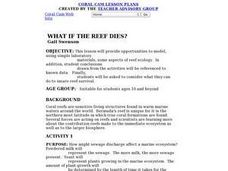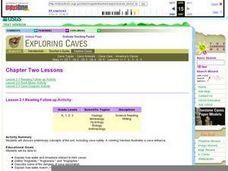American Museum of Natural History
Journey to Deep Sea Vents
Take a deep dive into oceanography. The online interactive allows for learners to board a submersible to dive to the bottom of the ocean to investigate sea vents. On the way down, individuals see different marine life at different...
American Museum of Natural History
Climate Change
It actually is possible to have too much of a good thing when it comes to climate change. A slide show lesson describes how burning fossil fuels contributes to climate change. Individuals read about the scientific process and the...
American Museum of Natural History
Planetary Mysteries
Get to know our little part of the vast universe. Learners read about the common and not-so-common facts about each of the planets in the solar system. The interactive lesson includes a large amount of information as well as a quiz to...
American Museum of Natural History
What's the Big Deal About Water?
It may seem simple, but water is one of the most unique substances on Earth. An interactive online lesson describes its properties and importance in so many different situations. Learners interact with the lesson to learn the role water...
American Museum of Natural History
Make Your Own Marine Biology Stationary
Encourage letter writing with marine biology-themed stationary. Three versions showcase a variety of underwater creatures.
Curated OER
Bermuda Today: Who Were Its Geologic Ancestors?
Students explore how the island of Bermuda came to be.
Curated OER
What If the Reef Dies?
Students complete four activities to investigate how reef ecology can change. They perform experiments to show how sewage discharge can affect a marine ecosystem, look at substances that don't dissolve in water, examine wave action...
Curated OER
Where In The World Is Bermuda?
Students locate the Island of Bermuda, and identify its absolute and relative location.
California Academy of Science
Sustainable Fishing in the Philippines
Understanding the importance of sustainable fishing practices is fostered through a classroom game. In small groups, the class plays a fishing game where they can see first-hand, the effects of thoughtless fishing practices. After the...
Curated OER
Reading Follow-up Activity
Students color a worksheet while discussing characteristics and composition of caves.
Curated OER
Home Sweet Home
Students explore marine turtle habitats. Students research one species of marine turtle found in the Gulf of Mexico. They identify plants and animals in the habitat. They create a model or replica using information gathered through their...
Curated OER
Aquatic Safari
Students use an Internet Web site to locate the scientific information about various marine species. They use the Internet to find the scientific information about marine animals.
Curated OER
Oceans in Motion
This simple lesson introduces children to basic marine life as well as to show them the necessity of protecting aquatic environments. Some famous marine life animals are introduced via vocabulary words, then children cut out pictures of...
Curated OER
What Is El Niño?
Students access information at remote sites using telecommunications, identify impacts by reviewing past El Ni??o events, make and use scale drawings, maps, and maps symbols to find locations and describe relationships.
Curated OER
Potential Consequences of Climate Variability and Change
Students examine the potential impact of climate change to agriculture, coastal areas, forests, water, and human health. They hypothesize what might happen to a sugar maple forest and hold a debate about global warming.
Curated OER
Symbiosis and Co-evolution
By choosing a species and researching an adaptive symbiotic relationship it shares with another species, your students are able to investigate a symbiotic relationship in a lab setting. They create a presentation using a variety of...
Curated OER
Explore Fish
Read Animals Called Fish with your young Spanish language learners and talk about the different parts of a fish. After teaching terms like huesos, columna vertebral, aletas, escamas, etc, Learners...
Curated OER
The Delany Garden
Students design and create a garden. They select flowers in small groups and research them. They draw a diagram of the landscape for their garden and plant flowers and observe them as they grow.
Curated OER
Exploring Caves
Students explore the various characteristics of caves. Through class discussion and hands on activities, students identify what forces converge in the creation of a cave. They complete review activities at the conclusion of the activity....
Curated OER
Follow a Fish
Students choose a fish from anywhere within the Ocean Center. They observe it for a given time, recording its behavior. Students comprehend the concept that living things have individual characteristics that enable them to live in their...
Curated OER
Reef Sharks!
Students visit an ocean aquarium exhibit where they can observe Black tip reef sharks. They observe the shark's behavior and read any information exhibited on the walls. They complete a worksheet based on information collected.
Curated OER
Rocks and Minerals
In this earth science worksheet, learners use the clues given at the bottom of the sheet to solve the crossword puzzle on mineral and rocks. They identify the various types of rocks formed and specific examples of these rocks.
Curated OER
Vocab-u-lous! Build a Fabulous Vocab
In this vocabulary worksheet, students select the best word choice to complete the sentence. The words all correspond to the theme of Valentine's Day.
Curated OER
Paper Molas
Delve into the history of textile art using this resource. Learners discuss the history of molas, a type of textile art made in Panama and Columbia, and talk about the importance of this process in the Kuna culture. Then, they create...
Other popular searches
- Coral Reefs
- Coral Reef Worksheets
- Coral Reef Food Chain
- Coral Reefs Coloring Pages
- Coral Reef Biology
- Coral Reef Art
- Coral Polyps
- Coral Reef Ecosystem
- Coral Reef Lesson Plans
- Coral Reef Bleaching
- Coral Reef Habitat
- Coral Communities

























